Dante: The Divine Comedy
Inferno Cantos XV-XXI
Authored and translated by A. S. Kline © Copyright 2000, All Rights Reserved.
This work may be freely reproduced, stored and transmitted, electronically or otherwise, for any non-commercial purpose. Conditions and Exceptions apply.
Contents
- Inferno Canto XV:1-42 The Violent against Nature: Brunetto Latini
- Inferno Canto XV:43-78 Brunetto’s prophecy
- Inferno Canto XV:79-99 Dante accepts his fate
- Inferno Canto XV:100-124 Brunetto names some of his companions
- Inferno Canto XVI:1-45 Rusticucci, Guido Guerra, Aldobrandi
- Inferno Canto XVI:46-87 The condition of Florence
- Inferno Canto XVI:88-136 The monster Geryon
- Inferno Canto XVII:1-30 The poets approach Geryon
- Inferno Canto XVII:31-78 The Usurers
- Inferno Canto XVII:79-136 The poets descend on Geryon’s back
- Inferno Canto XVIII:1-21 The Eighth Circle: Malebolge: Simple Fraud
- Inferno Canto XVIII:22-39 The First Chasm: The Pimps and Seducers
- Inferno Canto XVIII:40-66 The Panders: Venedico de’ Caccianemico
- Inferno Canto XVIII:67-99 The Seducers: Jason
- Inferno Canto XVIII:100-136 The Second Chasm: The Flatterers
- Inferno Canto XIX:1-30 The Third Chasm: The Sellers of Sacred Offices
- Inferno Canto XIX:31-87 Pope Nicholas III
- Inferno Canto XIX:88-133 Dante speaks against Simony
- Inferno Canto XX:1-30 The Fourth Chasm: The Seers and Sorcerers
- Inferno Canto XX:31-51 The Seers
- Inferno Canto XX:52-99 Manto and the founding of Mantua
- Inferno Canto XX:100-130 The Soothsayers and Astrologers
- Inferno Canto XXI:1-30 The Fifth Chasm: The Sellers of Public Offices
- Inferno Canto XXI:31-58 The Barrators
- Inferno Canto XXI:59-96 Virgil challenges the Demons’ threats
- Inferno Canto XXI:97-139 The Demons escort the Poets
Inferno Canto XV:1-42 The Violent against Nature: Brunetto Latini
Now one of the solid banks takes us on, and the smoke from the stream makes a shadow above, so that it shelters the water and its margins. Just as the Flemings between Bruges and Wissant make their dykes to hold back the sea, fearing the flood that beats against them; and as the Paduans do, along the Brenta, to defend their towns and castles, before Carinthia’s mountains feel the thaw; so those banks were similarly formed, though their creator, whoever it might be, made them neither as high or as deep.
Already we were so far from the wood, that I was unable to see where it was, unless I turned back, when we met a group of spirits, coming along the bank, and each of them looked at us, as, at twilight, men look at one another, under a crescent moon, and peered towards us, as an old tailor does at the eye of his needle. Eyed so by that tribe, I was recognised, by one who took me by the skirt of my robe, and said: ‘How wonderful!’
And I fixed my eyes on his baked visage, so that the scorching of his aspect did not prevent my mind from knowing him, and bending my face to his I replied: ‘Are you here Ser Brunetto?’ And he: ‘O my son, do not be displeased if Brunetto Latini turns back with you a while, and lets the crowd pass by.’ I said: ‘I ask it, with all my strength, and, if you want me to sit with you, I will, if it pleases him there, whom I go with.’
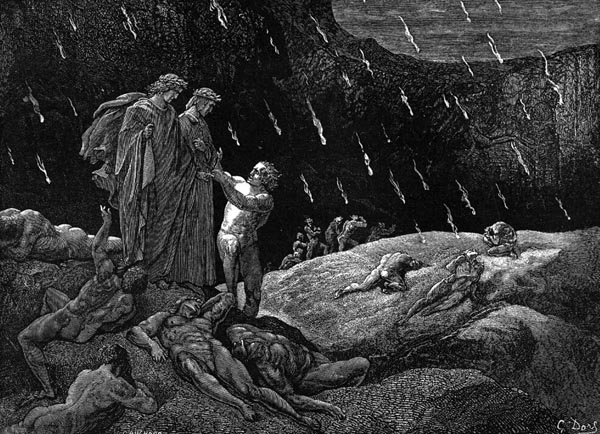
“Are you here Ser Brunetto?” (Inferno XV: 28, 29)
He said: ‘O my son, whoever of the flock stops for a moment, must lie there for a hundred years after, without cooling himself when the fire beats on him. So go on, I will follow at your heels, and then I will rejoin my crew again, who go mourning their eternal loss.’
Inferno Canto XV:43-78 Brunetto’s prophecy
I did not dare leave the road to be level with him, but kept my head bowed like one who walks reverently. He began: ‘What fate, or chance, bring you down here, before your final hour? Who is this who shows you the way?’ I replied: ‘I lost myself, in the clear life up above, in a valley, before my years were complete. Only yesterday morning I turned my back on it: he appeared to me as I was returning to it, and guides me back again, but by this path.’
And he to me: ‘If you follow your star, you cannot fail to reach a glorious harbour: if I judged clearly in the sweet life. If I had not died before you, I would have supported you in your work, seeing that Heaven is so kind to you. But that ungrateful, malignant people, who came down from Fiesole to Florence, in ancient times, and still have something of the mountain and the rock, will be inimical to you for the good you do, and with reason, since it is not fitting for the sweet fig tree to fruit, among the sour crab-apples.
Past report on earth declares them blind, an envious, proud and avaricious people: make sure you purge yourself of their faults. Your fate prophesies such honour for you, that both parties will hunger for you, but the goat will be far from the grass. Let the herd from Fiesole make manure of themselves, but not touch the plant in which the sacred seed of those Romans revives, who stayed, when that nest of malice was created, if any plant still springs from their ordure.’
Inferno Canto XV:79-99 Dante accepts his fate
I answered him: ‘If my wishes had been completely fulfilled, you would not have been separated, yet, from human nature, since, in my memory, the dear, and kind, paternal image of you is fixed, and now goes to my heart, how, when in the world, hour by hour, you taught me the way man makes himself eternal; and it is fitting my tongue should show what gratitude I hold, while I live. What you tell me of my fate, I write, and retain it with a former text, for a lady who will know, how to comment on it, if I reach her.
I would make this much known to you: I am ready for whatever Fortune wills, as long as conscience does not hurt me. Such prophecies are not new to my ears: so let Fortune turn her wheel as she pleases, and the peasant wield his mattock.’ At that, my Master, looked back, on his right, and gazed at me, then said: ‘He listens closely, who notes it.’
Inferno Canto XV:100-124 Brunetto names some of his companions
I carry on speaking, no less, with Ser Brunetto, and ask who are the most famous and noblest of his companions. And he to me: ‘It is good to know of some: of the rest it would be praiseworthy to keep silent, as the time would be too little for such a speech. In short, know that all were clerks, and great scholars, and very famous, tainted with the same sin on earth.
Priscian goes with that miserable crowd, and Francesco d’Accorso: and if you had any desire for such scum, you might have seen Andrea di Mozzi there, who by Boniface, the Pope, servus servorum Dei, servant of servants, was translated from the Arno to Vicenza’s Bacchiglione, where he departed from his ill-strained body.
I would say more, but my speech and my departure must not linger, since there I see new smoke, rising from the great sand. People come that I cannot be with: let my Tresoro be commended to you, in which I still live: more I ask not.’
Then he turned back, and seemed like one who runs for the green cloth, at Verona, through the open fields: and seemed one of those who wins, not one who loses.
Inferno Canto XVI:1-45 Rusticucci, Guido Guerra, Aldobrandi
I was already in a place where the booming of the water, that fell, into the next circle, sounded like a beehive’s humming, when three shades together, running, left a crowd that passed under the sharp burning rain. They came towards us, and each one cried: ‘Wait, you, who seem to us, by your clothes, to be someone from our perverse city.’
Ah me, what ancient, and recent, wounds I saw on their limbs, scorched there by the flames! It saddens me now, when I remember it. My teacher listened to their cries, turned his face towards me, and said: ‘Wait, now: courtesy is owed them, and if there were not this fire, that the place’s nature rains down, I would say that you were more hasty than them.’
As we rested, they started their former laments again, and when they reached us, all three of them formed themselves into a circle. Wheeling round, as champion wrestlers, naked and oiled, do, looking for a hold or an advantage, before they grasp and strike one another, each directed his face at me, so that his neck was turned, all the time, in an opposite direction to his feet.
And one of them began: ‘If the misery of this sinful place, and our scorched, stained look, renders us, and our prayers, contemptible, let our fame influence your mind to tell us who you are, that move your living feet, safely, through Hell. He, in whose footsteps you see me tread, all peeled and naked as he is, was greater in degree than you would think. His name is Guido Guerra, grandson of the good lady Gualdrada, and in his life he achieved much in council, and with his sword.
The other, that treads the sand behind me, is Tegghiaio Aldobrandi, whose words should have been listened to in the world. And I, who am placed with them in torment, am Jacopo Rusticucci, and certainly my fierce wife injured me more than anything else.’
Inferno Canto XVI:46-87 The condition of Florence
If I had been sheltered from the fire, I would have dropped down among them below, and I believe my teacher would have allowed it, but as I would have been burned and baked, myself, my fear overcame the goodwill, that made me eager to embrace them.
Then I began: ‘Your condition stirred sadness, not contempt, in me, so deeply, it will not soon be gone, when my guide spoke words to me by which I understood such men as yourselves might be approaching. I am of your city, and I have always heard, and rehearsed, your names and your deeds, with affection. I leave the gall behind, and go towards the sweet fruits promised me by my truthful guide, but first I must go downwards to the centre.’
He replied, then: ‘That your soul may long inhabit your body, and your fame shine after you, tell us if courtesy and courage, still live in our city as they used to, or if they have quite forsaken it? Gugliemo Borsiere, who has been in pain with us, a little while, and goes along there with our companions, torments us greatly with what he says.
‘New men, and sudden wealth, have created pride and excess in you, Florence, so that you already weep for it.’ So I cried with lifted face, and the three, who took this for an answer, gazed at one another, as one gazes at the truth. They replied together: ‘Happy are you, if, by speaking according to your will, it costs so little for you to satisfy others! So, if you escape these gloomy spaces, and turn, and see the beauty of the stars again, when you will be glad to say: “I was”, see that you tell people of us.’
Then they broke up their circle, and, as they ran, their swift legs seemed wings.
Inferno Canto XVI:88-136 The monster Geryon
An Amen could not have been said in so quick a time as their vanishing took, at which my Master was pleased to depart. I followed him. We had gone only a little way, when the sound of the water came so near us, that if we had been speaking we would hardly have heard each other.
Like that river (the first that takes its own course to the eastern seaboard, south of Monte Veso, where the Po rises, on the left flank of the Apennines, and is called Acquacheta above, before it falls to its lower bed, and loses its name, to become the Montone, at Forlì) which, plunging through a fall, echoes from the mountain, above San Benedetto, where there should be refuge for a thousand, so, down from a steep bank, we found that tainted water re-echoing, so much so that, in a short while, it would have dazed our hearing.
I had a cord tied round me, and with it I had once thought to catch the leopard with the spotted skin. After I had completely unwound it from myself, as my guide commanded, I held it out to him, gathered up and coiled. Then he turned towards the right, and threw the end of it, away from the edge a little, down into the steep gulf. I said to myself: ‘Surely something strange will follow this new sign of our intentions, that my master tracks with his eyes, as it falls.’
Ah, how careful men should be with those who do not only see our actions but, with their understanding, see into our thoughts! He said to me: ‘That which I expect will soon ascend, and, what your thoughts speculate about, will soon be apparent to your sight.’
A man should always shut his lips, as far as he can, to truth that seems like falsehood, since he incurs reproach, though he is blameless, but I cannot be silent here: and Reader, I swear to you, by the words of this Commedia, that they may not be free of lasting favour, that I saw a shape, marvellous, to every unshaken heart, come swimming upwards through the dense, dark air, as a man rises, who has gone down, sometime, to loose an anchor, caught on a rock or something else, hidden in the water, who spreads his arms out, and draws up his feet.
Inferno Canto XVII:1-30 The poets approach Geryon
‘See the savage beast, with the pointed tail, that crosses mountains, and pierces walls and armour: see him, who pollutes the whole world.’ So my guide began to speak to me, and beckoned to him to land near the end of our rocky path, and that vile image of Fraud came on, and grounded his head and chest, but did not lift his tail onto the cliff.
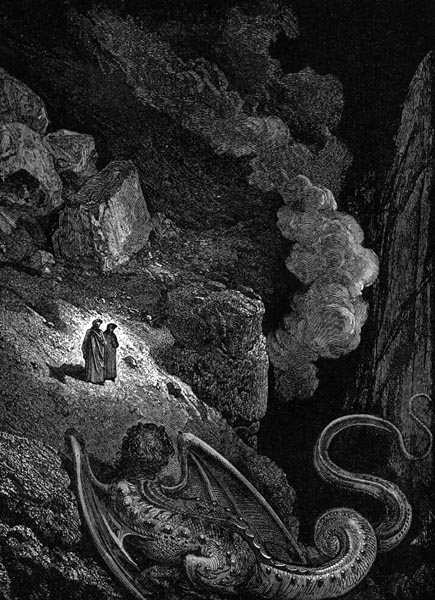
“That vile image of Fraud came on…” (Inferno XVII: 7)
His face was the face of an honest man, it had so benign an outward aspect: all the rest was a serpent’s body. Both arms were covered with hair to the armpits; the back and chest and both flanks were adorned with knots and circles. Tartars or Turks never made cloths with more colour, background and embroidery: nor did Arachne spread such webs on her loom. As the boats rest on the shore, part in water and part on land, and as the beaver, among the guzzling Germans, readies himself for a fight, so that worst of savage creatures lay on the cliff that surrounds the great sand with stone.
The whole of his tail glanced into space, twisting the venomous fork upwards, that armed the tip, like a scorpion. My guide said: ‘Now we must direct our path, somewhat, towards the malevolent beast that rests there.’
Inferno Canto XVII:31-78 The Usurers
Then we went down, on the right, and took ten steps towards the edge, so that we could fully avoid the sand and flame, and when we reached him, I saw people sitting near the empty space, a little further away, on the ground.
Here my Master said: ‘Go and see the state of them, so that you may take away a complete knowledge of this round. Talk briefly with them: I will speak with this creature, until you return, so that he might carry us on his strong shoulders.’ So, still on the extreme edge of the seventh circle, I went, all alone, to where the sad crew were seated.
Their grief was gushing from their eyes: they kept flicking away the flames and sometimes the burning dust, on this side, or on that, with their hands, no differently than dogs do in summer, now with their muzzle, now with their paws, when they are bitten by fleas, or gnats, or horse-flies. When I set my eyes on the faces of several of them, on whom the grievous fire falls, I did not recognise any, but I saw that a pouch hung from the neck of each, that had a certain colour, and a certain seal, and it seemed their eye was feeding on it. And as I came among them, looking, I saw, on a golden-yellow purse, an azure seal that had the look and attitude of a lion.
Then my gaze continuing on its track, I saw another, red as blood, showing a goose whiter than butter. And one who had his white purse stamped with an azure, pregnant sow, said to me: ‘What are you doing in this pit? Now go away, and since you are still alive, know that my neighbour, Vitaliano, will come to sit here on my left. I, a Paduan, am with these Florentines. Many a time they deafen my hearing, shouting: ‘Let the noble knight come, who will carry the purse with three eagles’ beaks!’
Then he distorted his mouth, and thrust his tongue out, like an ox licking its nose, and I, dreading lest a longer stay might anger him, who had warned me to make a brief stay, turned back from those weary spirits.
Inferno Canto XVII:79-136 The poets descend on Geryon’s back
I found my guide, who had already mounted the flank of the savage creature, and he said to me: ‘Be firm and brave. Now we must descend by means of these stairs: you climb in front: I wish to be in the centre, so that the tail may not harm you.’
Like a man whose fit of the quartan fever is so near, that his nails are already pallid, and he shakes all over, by keeping in the shade, so I became when these words were said: but his reproof roused shame in me, that makes the servant brave in the presence of a worthy master. I set myself on those vast shoulders. I wished to say: ‘See that you clasp me tight.’ but my voice did not come out as I intended. He, who helped me in other difficulties, at other times, embraced me, as soon as I mounted, and held me upright. Then he said: ‘Now move, Geryon! Make large circles, and let your descent be gentle: think of the strange burden that you carry.’
As a little boat goes backwards, backwards, from its mooring, so the monster left the cliff, and when he felt himself quite free, he turned his tail around, to where his chest had been, and stretching, flicked it like an eel, and gathered the air towards him with his paws. I do not believe the fear was greater when Phaëthon let slip the reins, and the sky was scorched, as it still appears to be; or when poor Icarus felt the feathers melt from his arms, as the wax was heated, and his father Daedalus cried: ‘You are going the wrong way!’ as mine was when I saw myself surrounded by the air, on all sides, and saw everything vanish, except the savage beast.
He goes down, swimming slowly, slowly: wheels and falls: but I do not see it except by the wind, on my face, and from below. Already I heard the cataract, on the right, make a terrible roaring underneath us, at which I stretched my neck out, with my gaze downwards. Then I was more afraid to dismount, because I saw fires, and heard moaning, so that I cowered, trembling all over. And then I saw what I had not seen before, our sinking and circling through the great evils that drew close on every side.
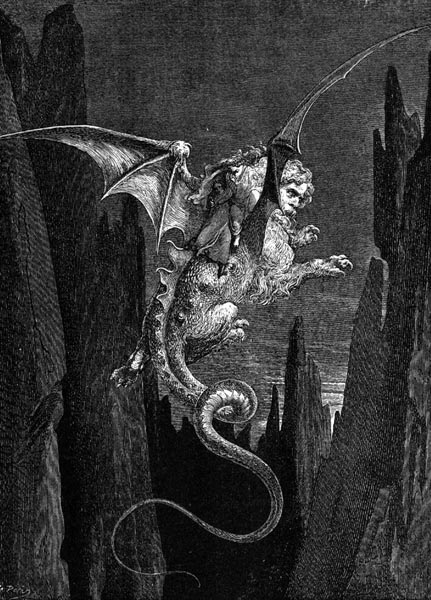
“Then I was more afraid to dismount…” (Inferno XVII: 117)
As the falcon, that has been long on the wing, descends wearily, without seeing bird or lure, making the falconer cry: ‘Ah, you stoop!’ and settles far from his master disdainful and sullen, so Geryon set us down, at the base, close to the foot of the fractured rock, and relieved of our weight, shot off, like an arrow from the bow.
Inferno Canto XVIII:1-21 The Eighth Circle: Malebolge: Simple Fraud
There is a place in Hell called Malebolge, all of stone, and coloured like iron, as is the cliff that surrounds it. Right in the centre of the malignant space, a well yawns, very wide and deep, whose structure I will speak of in due place.
The margin that remains, between the base of the high rocky bank and the well, is circular, and its floor is divided into ten moats. Like the form the ground reveals, where successive ditches circle a castle, to defend the walls, such was the layout displayed here. And as there are bridges to the outer banks from the thresholds of the fortress, so, from the base of the cliff, causeways ran, crossing the successive banks and ditches, down to the well that terminates and links them.
We found ourselves there, shaken from Geryon’s back, and the Poet kept to the left, and I went on, behind him.
Inferno Canto XVIII:22-39 The First Chasm: The Pimps and Seducers
On the right I saw new pain and torment, and new tormentors, with which the first chasm was filled. In its depths the sinners were naked: on our inner side of its central round they came towards us, on the outer side, with us, but with larger steps. So the people of Rome, in that year, at the Jubilee, because of the great crowds, initiated this means to pass the people over the bridge: those on the one side all had their faces towards Castello Sant’ Angelo, and went to St Peter’s: those on the other towards Monte Giordano.
On this side and on that, along the fearful rock, I saw horned demons with large whips, who struck them fiercely, from behind. Ah, how it made them quicken their steps at the first stroke! Truly none waited for the second or third.
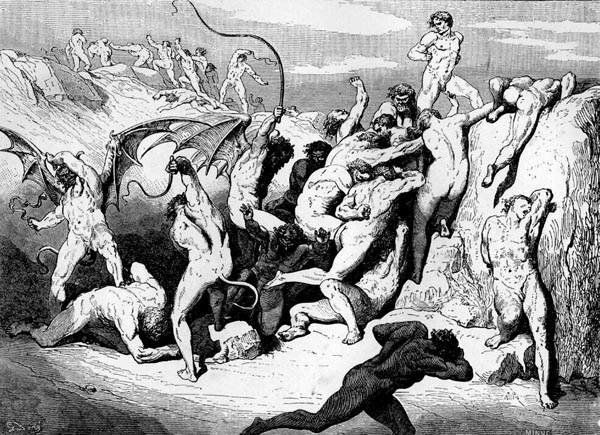
“Ah, how it made them quicken their steps at the first stroke!” (Inferno XVIII: 38)
Inferno Canto XVIII:40-66 The Panders: Venedico de’ Caccianemico
As I went on, my eyes encountered one of them, and instantly I said: This shade I have seen before.’ So I stopped to scrutinise him, and the kind guide stood still with me, and allowed me to return a little. And that scourged spirit thought to hide himself, lowering his face, but it did not help, since I said: ‘You, who cast your eyes on the ground, if the features you display are not an illusion, you are Venedico Caccianimico: but what led you into such a biting pickle?’
And he to me: ‘I tell it unwillingly, but your clear speech that makes me remember the former world, compels me. It was I who induced the fair Ghisola to do the Marquis of Este’s will, however unpleasant the story sounds. And I am not the only Bolognese that weeps here: this place is so filled with us, that as many tongues are no longer taught to say sipa for sì, between the Savena’s stream that is west, and the Reno’s, that is east of Bologna. If you want assurance and testimony of it, recall to mind our avaricious hearts.’ And as he spoke, a demon struck him with his whip, and said: ‘Away, pander, there are no women here to sell.’
Inferno Canto XVIII:67-99 The Seducers: Jason
I rejoined my guide: then in a few steps we came to where a causeway ran from the cliff. This we climbed very easily, and, turning to the right on its jagged ridge, we moved away from that eternal round. When we reached the arch where it yawns below to leave a path for the scourged, my guide said: ‘Wait, and let the aspect of those other ill-born spirits strike you, whose faces you have not yet seen, since they have been going in our direction.’
We viewed their company from the ancient bridge, travelling towards us on the other side, chased likewise by the whip. Without my asking, the kind Master said to me: ‘Look at that great soul who comes, and seems not to shed tears of pain: what a royal aspect he still retains! That is Jason, who, by wisdom and courage, robbed the Colchians of the Golden Fleece.
He sailed by the Isle of Lemnos, after the bold merciless women there had put all their males to death. There with gifts and sweet words he deceived the young Hypsipyle, who had saved her father by deceiving all the rest. He left her there, pregnant and lonely: such guilt condemns him to such torment: and revenge is also taken for his abandoning Medea. With him go all who practise like deceit, and let this be enough for knowledge of the first chasm, and those whom it swallows.’
Inferno Canto XVIII:100-136 The Second Chasm: The Flatterers
We had already come to where the narrow causeway crosses the second bank, and forms a buttress to a second arch. Here we heard people whining in the next chasm, and blowing with their muzzles, and striking themselves with their palms.
The banks were crusted, with a mould from the fumes below that condenses on them, and attacks the eyes and nose. The floor is so deep, that we could not see any part of it, except by climbing to the ridge of the arch, where the rock is highest. We came there, and from it, in the ditch below, I saw people immersed in excrement, that looked as if it flowed from human privies. And while I was searching it, down there, with my eyes, I saw one with a head so smeared with ordure, that it was not clear if he was clerk or layman.
He shouted at me: ‘Why are you so keen to gaze at me more than the other mired ones?’ And I to him: ‘Because, if I remember rightly, I have seen you before with dry head, and you are Alessio Interminei of Lucca: so I eye you more than all the others.’ And he then, beating his forehead: ‘The flatteries, of which my tongue never wearied, have brought me down to this!’
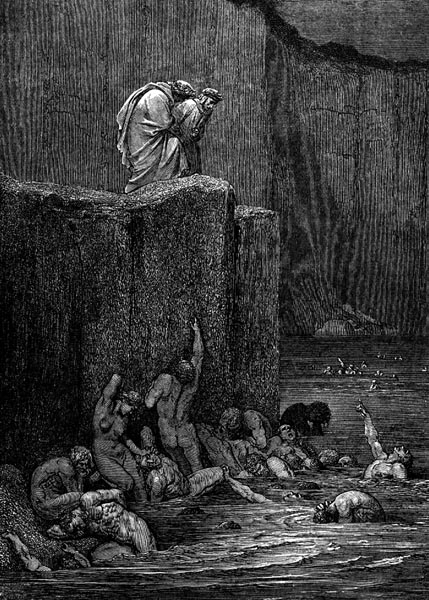
“‘Why are you so keen to gaze at me more than the other mired ones?’” (Inferno XVIII: 116, 117)
At which my guide said to me: ‘Advance your head a little, so that your eyes can clearly see, over there, the face of that filthy and dishevelled piece, who scratches herself, with her soiled nails, now crouching down, now rising to her feet. It is Thais, the whore, who answered her lover’s message, in which he asked: “Do you really return me great thanks?” with “No, wondrous thanks.” And let our looking be sated with this.’
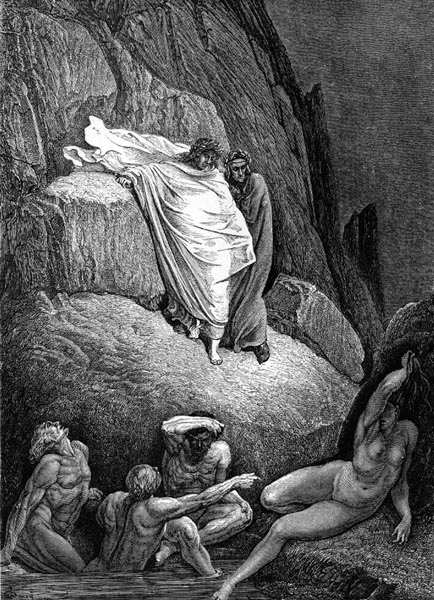
“It is Thais, the whore, who answered her lover’s message, in which he asked: ‘Do you really return me great thanks?’” (Inferno XVIII: 130—132)
Inferno Canto XIX:1-30 The Third Chasm: The Sellers of Sacred Offices
O Simon Magus! O you, his rapacious, wretched followers, who prostitute, for gold and silver, the things of God that should be wedded to virtue! Now the trumpets must sound for you, since you are in the third chasm.
Already we had climbed to the next arch, onto that part of the causeway that hangs right over the centre of the ditch. O Supreme Wisdom, how great the art is, that you display, in the heavens, on earth, and in the underworld, and how justly your virtue acts. On the sides and floor of the fosse, I saw the livid stone full of holes, all of one width, and each one rounded. They seemed no narrower or larger, than those in my beautiful Baptistery of St John, made as places to protect those baptising, one of which I broke, not many years ago, to aid a child inside: and let this be a sign of the truth to end all speculation.
From the mouth of each hole, a sinner’s feet and legs emerged, up to the calf, and the rest remained inside. The soles were all on fire, so that the joints quivered so strongly, that they would have snapped grass ropes and willow branches. As the flame of burning oily liquids moves only on the surface, so it was in their case, from the heels to the legs.
Inferno Canto XIX:31-87 Pope Nicholas III
I said: ‘Master, who is that, who twists himself about, writhing more than all his companions, and licked by redder flames?’ And he to me: ‘If you will let me carry you down there by the lower bank, you will learn from him about his sins and himself.’ And I: ‘Whatever pleases you is good for me: you are my lord, and know that I do not deviate from your will, also you know what is not spoken.’
Then we came onto the fourth buttress: we turned and descended, on the left, down into the narrow and perforated depths. The kind master did not let me leave his side until he took me to the hole occupied by the one who so agonised with his feet.
I began to speak: ‘O, unhappy spirit, whoever you are, who have your upper parts below, planted like a stake, form words if you can.’ I stood like the friar who gives confession to a treacherous assassin, who, after being fixed in the ground, calls the confessor back, and so delays his burial. And he cried: ‘Are you standing there already, Boniface, are you standing there already? The book of the future has deceived me by several years. Are you sated, so swiftly, with that wealth, for which you did not hesitate to seize the Church, our lovely lady, and then destroy her?’
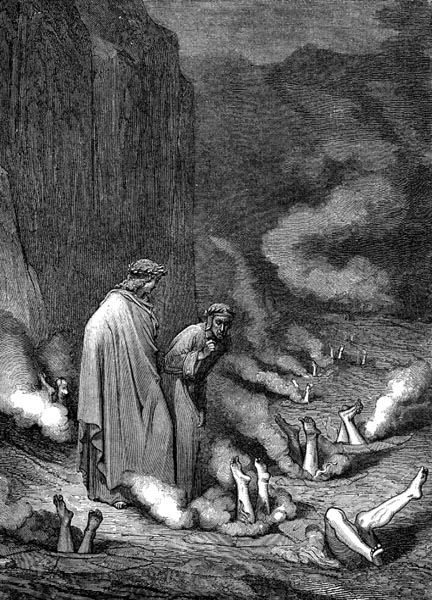
“I stood like the friar who gives confession to a treacherous assassin…” (Inferno XIX: 51, 52)
I became like those who stand, not knowing what has been said to them, and unable to reply, exposed to scorn. Then Virgil said: ‘Quickly, say to him, “I am not him, I am not whom you think.” ’ And I replied as I was instructed. At which the spirit’s legs writhed fiercely: then, sighing, in a tearful voice, he said to me: ‘Then what do you want of me? If it concerns you so much to know who I am, that you have left the ridge, know that I wore the Great Mantle, and truly I was son of the Orsini she-bear, so eager to advance her cubs, that I pursed up wealth, above, and here myself.
The other simonists, who came before me, are drawn down below my head, cowering inside the cracks in the stone. I too will drop down there, when Boniface comes, the one I mistook you for when I put my startled question. But the extent of time, in which I have baked my feet, and stood like this, reversed, is already longer than the time he shall stand planted in turn with glowing feet, since, after him, will come Clement, the lawless shepherd, of uglier actions, fit indeed to cap Boniface and me.
He will be a new Jason, the high priest, whom we read about in Maccabees: and as his king Antiochus was compliant, so will Philip be, who governs France.’
Inferno Canto XIX:88-133 Dante speaks against Simony
I do not know if I was too foolhardy then, but I answered him in this way: ‘Ah, now tell me, how much wealth the Lord demanded of Peter, before he gave the keys of the Church into his keeping? Surely he demanded nothing, saying only: ‘Follow me.’ Nor did Peter or the other Apostles, ask gold or silver of Matthias, when he was chosen to fill the place that Judas, the guilty soul, had forfeited. So, remain here, since you are justly punished, and keep well the ill-gotten money, that made you so bold against Charles of Anjou.
And were it not that I am still restrained by reverence for the great keys that you held in your hand in the joyful life, I would use even more forceful words, since your avarice grieves the world, trampling the good, and raising the wicked. John the Evangelist spoke of shepherds such as you, when he saw ‘the great whore that sitteth upon many waters, with whom the kings of the earth have committed fornication’, she that was born with seven heads and, as long as virtue pleased her spouse, had justification.
You have made a god for yourselves of gold and silver, and how do you differ from the idolaters, except that he worships one image and you a hundred? Ah, Constantine, how much evil you gave birth to, not in your conversion, but in that Donation that the first wealthy Pope, Sylvester, received from you!’
And while I sung these notes to him, he thrashed violently with both his feet, either rage or conscience gnawing him. I think it pleased my guide, greatly, he had so satisfied an expression, listening to the sound of the true words I spoke. So he lifted me with both his arms, and when he had me quite upon his breast, climbed back up the path he had descended, and did not tire of carrying me clasped to him, till he had borne me to the summit of the arch, that crosses from the fourth to the fifth rampart.
Here he set his burden down, lightly: light for him, on the rough steep cliff, that would be a difficult path for a goat. From there another valley was visible to me.
Inferno Canto XX:1-30 The Fourth Chasm: The Seers and Sorcerers
I must make verses of new torments, and give matter for this twentieth Canto, of the Inferno that treats of the damned.
I was now quite ready to look into the ditch, bathed with tears of anguish, which was revealed to me: I saw people coming, silent and weeping, through the circling valley, at a pace which processions, that chant Litanies, take through the world. When my eyes looked further down on them, each of them appeared strangely distorted, between the chin and the start of the chest, since the head was reversed towards the body, and they had to move backwards, since they were not allowed to look forwards. Perhaps one might be so distorted by palsy, but I have not seen it, and do not credit it.
Reader, as God may grant that you profit from your reading, think now yourself how I could keep from weeping, when I saw our image so contorted, nearby, that the tears from their eyes bathed their hind parts at the cleft. Truly, I wept, leaning against one of the rocks of the solid cliff, so that my guide said to me: ‘Are you like other fools, as well? Pity is alive here, where it is best forgotten. Who is more impious than one who bears compassion for God’s judgement?’
Inferno Canto XX:31-51 The Seers
‘Lift your head, lift it and see him for whom earth opened, under the eyes of the Thebans, at which they all shouted: “Where are you rushing, Amphiaräus? Why do you quit the battle?” And he did not stop his downward rush until he reached Minos, who grasps every sinner. Note how he has made a chest of his shoulders: because he willed to see too far beyond him, he now looks behind and goes backwards.
See Tiresias, who changed his form, when he was made a woman, all his limbs altering: and later he had to strike the two entwined snakes with his staff, a second time, before he could resume a male aspect.
That one is Aruns, who has his back to Tiresias’s belly, he who in the mountains of Tuscan Luni, where the Carrarese hoe, who live beneath them, had a cave to live in, among the white marble, from which he could gaze at the stars and the sea, with nothing to spoil his view.’
Inferno Canto XX:52-99 Manto and the founding of Mantua
‘And she that hides her breasts, that you cannot see, with her flowing tresses, and has all hairy skin on the other side, was Manto, who searched through many lands, then settled where I was born, about which it pleases me to have you listen to me speak a while.
After her father departed from life, and Thebes, the city of Bacchus, came to be enslaved, she roamed the world a long time. A lake, Lake Garda, lies at the foot of the Alps, up in beautiful Italy, where Germany is closed off beyond the Tyrol. Mount Apennino, between the town of Garda and Val Camonica, is bathed by the water that settles in the lake. In the middle there is a place where the Bishops of Trent, Brescia, and Verona might equally give the blessing if they went that way. A strong and beautiful fortress stands, where the shoreline is lowest, to challenge the Brescians and Bergamese.
There, all the water that cannot remain in the breast of Lake Garda, has to descend through the green fields, and form a river. As soon as the water has its head, it is no longer Garda, but Mincio, down to Governolo where it joins the Po. It has not flowed far before it finds the level, on which it spreads and makes a marsh there, and in summer tends to be unwholesome. Manto, the wild virgin, passing that way, saw untilled land, naked of inhabitants, among the fens. There, to avoid all human contact, she stayed, with her followers, to practise her arts, and lived there, and left her empty body.
Then the people who were scattered round gathered together in that place, which was well defended by the marshes on every side. They built the city over those dead bones, and without other augury, called it Mantua, after her who first chose the place. Once there were more inhabitants, before Casalodi, was foolishly deceived by Pinamonte. So, I charge you, if you ever hear another story of the origin of my city, do not let falsehoods destroy the truth.’
Inferno Canto XX:100-130 The Soothsayers and Astrologers
And I said: ‘Master, your speeches are so sound to me, and so hold my belief, that any others are like spent ashes. But tell me about the people who are passing, if you see any of them worth noting, since my mind returns to that alone.’
Then he said to me: ‘That one, whose beard stretches down from his cheeks, over his dusky shoulders, was an augur, when Greece was so emptied of males, for the expedition against Troy, that there were scarcely any left, even in their cradles. Like Calchas at Aulis, he set the moment for cutting loose the first cable. Eurypylus is his name, and my high Poem sings of it in a certain place: you know it well, who know the whole thing.
The other, so thin about the flanks, is Michael Scott, who truly understood the fraudulent game of magic. See Guido Bonatti, see Asdente, who wishes now he had attended more to his shoemaker’s leather and cord, but repents too late. See the miserable women who abandoned needle, shuttle and spindle, and became prophetesses: they made witchcraft, using herbs and images.
But come, now, for Cain with his bundle of thorns, that Man in the Moon, reaches the western confines of both hemispheres, and touches the waves south of Seville, and already, last night, the Moon was full: you must remember it clearly, since she did not serve you badly in the deep wood.’ So he spoke to me, and meanwhile we moved on.
Inferno Canto XXI:1-30 The Fifth Chasm: The Sellers of Public Offices
So from bridge to bridge we went, with other conversation which my Commedía does not choose to recall, and were at the summit arch when we stopped to see the next cleft of Malebolge, and more vain grieving, and I found it marvellously dark.
As, in the Venetian Arsenal, the glutinous pitch boils in winter, that they use to caulk the leaking boats they cannot sail; and so, instead one man builds a new boat, another plugs the seams of his, that has made many voyages, one hammers at the prow, another at the stern, some make oars, and some twist rope, one mends a jib, the other a mainsail; so, a dense pitch boiled down there, not melted by fire, but by divine skill, and glued the banks over, on every side.
I saw it, but nothing in it, except the bubbles that the boiling caused, and the heaving of it all, and the cooling part’s submergence. While I was gazing fixedly at it, my guide said: ‘Take care. Take care!’ and drew me towards him, from where I stood. Then I turned round, like one who has to see what he must run from, and who is attacked by sudden fear, so that he dare not stop to look: and behind us I saw a black Demon come running up the cliff.
Inferno Canto XXI:31-58 The Barrators
Ah, how fierce his aspect was! And how cruel he seemed in action, with his outspread wings, and nimble legs! His high pointed shoulders, carried a sinner’s two haunches, and he held the sinews of each foot tight.
He cried: ‘You, Malebranche, the Evil-clawed, see here is one of Lucca’s elders, that city whose patron is Santa Zita: push him under while I go back for the rest, back to that city which is well provided with them: every one there is a barrator, except Bonturo; there they make ‘Yes’ of ‘No’ for money.
He threw him down, then wheeled back along the stony cliff, and never was a mastiff loosed so readily to catch a thief. The sinner plunged in, and rose again writhing, but the demons under cover of the bridge, shouted: ‘Here the face of Christ, carved in your cathedral, is of no avail: here you swim differently than in the Serchio: so, unless you want to try our grapples, do not emerge above the pitch.’
Then they struck at him with more than a hundred prongs, and said: ‘Here you must dance, concealed, so that you steal in private, if you can.’ No different is it, when the cooks make their underlings push the meat down into the depths of the cauldrons with their hooks, to stop it floating.
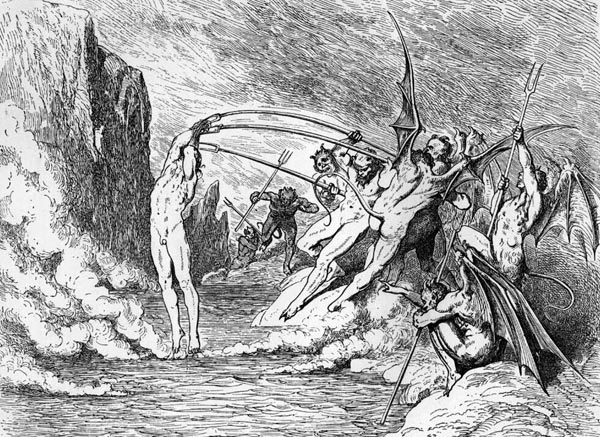
“Then they struck at him with more than a hundred prongs…” (Inferno XXI: 50, 51)
Inferno Canto XXI:59-96 Virgil challenges the Demons’ threats
The good master said to me: ‘Cower down behind a rock, so that you have a screen to protect yourself, and so that it is not obvious that you are here, and whatever insult is offered to me, have no fear, since I know these matters, having been in a similar danger before.’ Then he passed beyond the bridgehead, and when he arrived on the sixth bank, it was necessary for him to present a bold front.
The demons rushed from below the bridge, and turned their weapons against him, with the storm and fury with which a dog rushes at a poor beggar, who suddenly seeks alms when he stops. But Virgil cried: ‘None, of you, commit an outrage. Before you touch me with your forks, one of you come over here, to listen, and then discuss whether you will grapple me.’ They all cried: ‘You go, Malacoda’ at which one moved while the others stood still, and came towards Virgil, saying: ‘What good will it do him?’
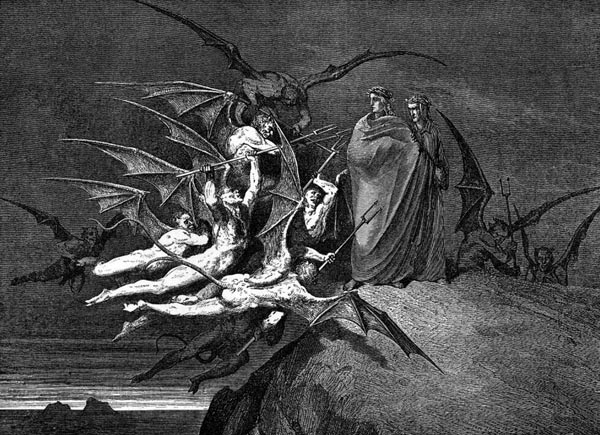
“‘None, of you, commit an outrage.’” (Inferno XXI: 70)
My Master said: ‘Malacoda, do you think I have come here without the Divine Will, and propitious fate, safe from all your obstructions? Let me go by, since it is willed, in Heaven, that I show another this wild road.’ Then the demon’s pride was so down, that he let the hook drop at his feet, and said to the others: ‘Now, do not hurt him!’ And my guide to me: ‘O you, who are sitting, crouching, crouching amongst the bridge’s crags, return to me safely, now!’ At which I moved, and came to him quickly, and the devils all pressed forward so that I was afraid they would not hold to their orders. So I once saw the infantry, marching out, under treaty of surrender, from Caprona, afraid at finding themselves surrounded by so many enemies.
Inferno Canto XXI:97-139 The Demons escort the Poets
I pressed my whole body close to my guide, and did not take my eyes away from their aspect, which was hostile. They lowered their hooks, and kept saying, to one another: ‘Shall I touch him on the backside?’ and answering, ‘Yes, see that you give him a nick.’
But that demon who was talking to my guide, turned round quickly, and said: ‘Be quiet, be quiet, Scarmiglione.’ Then he said to us: ‘It will not be possible to go any further along this causeway, since the sixth arch is lying broken at the base, and if you desire still to go forward, go along this ridge, and nearby is another cliff that forms a causeway. Yesterday, five hours later than this hour, twelve hundred and sixty-six years were completed, since this path here was destroyed.
I am sending some of my company here to see if anyone is out for an airing: go with them, they will not commit treachery.’ Then he began speaking: ‘Advance, Alichino and Calcabrina, and you, Cagnazzo: let Barbariccia lead the ten. Let Libicocco come as well, and Draghignazzo, tusked Ciriatto, Grafficane, Farfarello, and Rubicante the mad one. Search round the boiling glue: see these two safe, as far as the other cliff that crosses the chasms, completely, without a break.’
I said: ‘O me! Master, what do I see? Oh, let us go alone, without an escort, if you know the way: as for me, I would prefer not. If you are as cautious as usual, do you not see how they grind their teeth, and darken their brows, threatening us with mischief? And he to me: ‘I do not want you to be afraid: let them grin away at their will: since they do it for the boiled wretches.’
They turned by the left bank: but first, each of them had stuck his tongue out, between his teeth, towards their leader, as a signal, and he had made a trumpet of his arse.